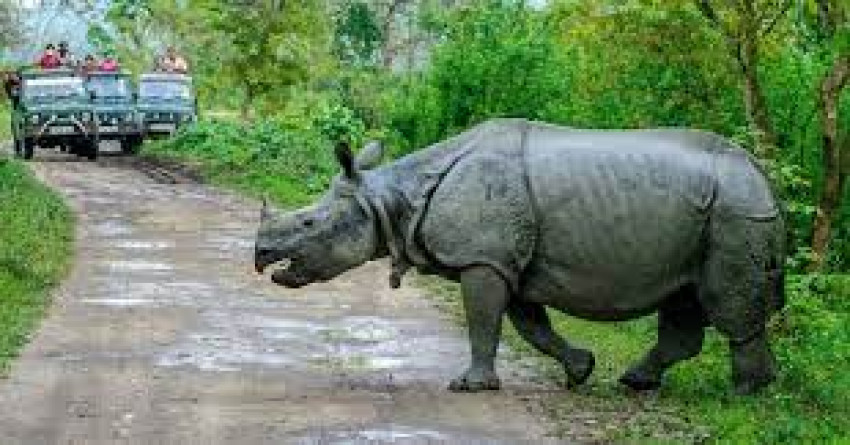Pobitora Wildlife Sanctuary Travel Guide
Pobitora Wildlife Sanctuary, located in the Morigaon district of Assam, India, is a paradise for nature lovers and wildlife enthusiasts. Spread over an area of 38.8 square kilometers, this sanctuary is famous for its high population density of the Indian one-horned rhinoceros. The sanctuary also houses a variety of other wildlife species, including wild boars, Asiatic water buffaloes, and various bird species. Pobitora Wildlife Sanctuary is a must-visit destination for those seeking a close encounter with nature and wildlife in their natural habitat.Top Attractions in Pobitora Wildlife Sanctuary
- Thrilling Jeep Safaris
- One-horned Rhinoceros Spotting
- Bird Watching Opportunities
- Nature Walks and Treks
Pobitora Wildlife Sanctuary is Famous for
The sanctuary is most famous for its high density of Indian one-horned rhinoceros, providing a unique opportunity to observe these magnificent creatures up close in their natural habitat.Top Attractions in Pobitora Wildlife Sanctuary
- Thrilling Jeep Safaris
- One-horned Rhinoceros Spotting
- Bird Watching Opportunities
- Nature Walks and Treks
What's Great about Travelling to Pobitora Wildlife Sanctuary?
- Perfect destination for wildlife enthusiasts
- Opportunity to see the Indian one-horned rhinoceros up close
What's Not So Great about Travelling to Pobitora Wildlife Sanctuary?
- Limited accommodation options within the sanctuary
- May not be suitable for those looking for urban or nightlife experiences
Travel Tips for Pobitora Wildlife Sanctuary
- Obtain necessary permits for entry into the sanctuary
- Follow instructions of the forest guides during safaris
- Carry binoculars and cameras for wildlife spotting
Important Pobitora Wildlife Sanctuary trip information
- Ideal Duration: 2-3 days
- Best Time to Visit: November to April
- Nearby Airports and Railway Stations: Guwahati Airport and Guwahati Railway Station
FAQ's on Pobitora Wildlife Sanctuary
Q1: What is the best time to visit Pobitora Wildlife Sanctuary?
The best time to visit Pobitora Wildlife Sanctuary is during the dry season from November to April. This period offers pleasant weather for wildlife viewing and safaris. Avoid the monsoon season from May to October as the heavy rains can make the sanctuary inaccessible. The peak tourist season is from November to February when the weather is cool and ideal for exploring the sanctuary.
Q2: Do I need a visa to travel to Pobitora Wildlife Sanctuary?
As Pobitora Wildlife Sanctuary is located in India, international tourists will need a valid Indian visa to visit. Ensure you have the necessary visa before your travel. Check with the Indian embassy or consulate for specific visa requirements based on your nationality.
Q3: What are the must-visit attractions in Pobitora Wildlife Sanctuary?
Pobitora Wildlife Sanctuary is famous for its dense population of one-horned rhinoceros. Visitors must take a safari to witness these majestic creatures up close. Other attractions include the diverse bird species, including migratory birds, and the beautiful landscapes of the sanctuary.
Q4: Is Pobitora Wildlife Sanctuary a safe place to travel?
Pobitora Wildlife Sanctuary is generally safe for tourists. Follow the instructions of your guide during safaris and avoid straying from designated paths. It is advisable to stay updated on any wildlife sightings and maintain a safe distance from the animals. Be cautious of wild elephants, especially during certain seasons.
Q5: What is the local currency in Pobitora Wildlife Sanctuary and can I use credit cards?
The local currency in Pobitora Wildlife Sanctuary, as in India, is the Indian Rupee (INR). While credit cards may be accepted at some hotels and larger establishments, it's advisable to carry cash for smaller purchases. ATMs are available in nearby towns for currency exchange and withdrawals.
Q6: What is the local cuisine like in Pobitora Wildlife Sanctuary?
The local cuisine in Pobitora Wildlife Sanctuary and the surrounding region typically includes Assamese dishes. Try traditional Assamese thalis, which consist of rice, dal, vegetables, and fish or meat preparations. Vegetarians can enjoy dishes like khar, xaak, and a variety of chutneys made from local ingredients.
Q7: What transportation options are available in Pobitora Wildlife Sanctuary?
Transportation options in Pobitora Wildlife Sanctuary include hiring a private car or taxi from nearby towns like Guwahati. Public buses are also available, but the most convenient way to explore the sanctuary is through organized safaris provided by the authorities. Guided tours offer a better chance to spot wildlife.
Q8: Are there any cultural norms or etiquette I should be aware of when visiting Pobitora Wildlife Sanctuary?
When visiting Pobitora Wildlife Sanctuary, respect the local culture and customs. Dress modestly, especially when interacting with local communities. Seek permission before taking photographs of people or local homes. It is customary to greet locals with a 'Namaste' or 'Sualaaam' and be polite and courteous during your stay.
Q9: I am a travel agent. How can I buy travel leads of Pobitora Wildlife Sanctuary?
Register yourself as a travel agent at agents.tripclap.com and then you can buy travel leads to Pobitora Wildlife Sanctuary once your account is approved. For more details contact our support team at +91-8069186564 or support@tripclap.com

